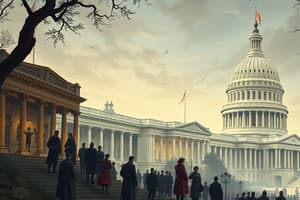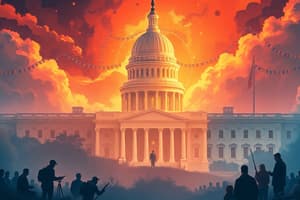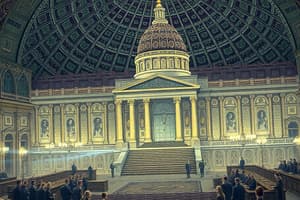Podcast
Questions and Answers
What is legislative oversight?
What is legislative oversight?
Congressional review of the activity of an agency, department, or office
What is the necessary and proper clause?
What is the necessary and proper clause?
Gives Congress the authority to pass all laws necessary and proper to carry out the enumerated powers specified in the Constitution.
What is a standing committee?
What is a standing committee?
A committee to which proposed bills are referred, continues from one Congress to the next.
What is a joint committee?
What is a joint committee?
What are special committees?
What are special committees?
What is the purpose of a conference committee?
What is the purpose of a conference committee?
What do subcommittees do?
What do subcommittees do?
Legislative committees are mentioned in the Constitution.
Legislative committees are mentioned in the Constitution.
How are legislative committee assignments made?
How are legislative committee assignments made?
What are the functions and purposes of committees?
What are the functions and purposes of committees?
What happens during committee action?
What happens during committee action?
What are the basic steps for how a bill becomes a law?
What are the basic steps for how a bill becomes a law?
What happens when a bill is introduced to the House?
What happens when a bill is introduced to the House?
What happens when a bill is introduced to the Senate?
What happens when a bill is introduced to the Senate?
What occurs during committee action in the House?
What occurs during committee action in the House?
What does the Rules Committee do in the House?
What does the Rules Committee do in the House?
What occurs during floor action in the House?
What occurs during floor action in the House?
What occurs during committee action in the Senate?
What occurs during committee action in the Senate?
What happens during floor action in the Senate?
What happens during floor action in the Senate?
What is the President's involvement in a bill?
What is the President's involvement in a bill?
Why do bills fail?
Why do bills fail?
What is a filibuster?
What is a filibuster?
What is a discharge petition?
What is a discharge petition?
What is logrolling?
What is logrolling?
What is specialization in the context of labor?
What is specialization in the context of labor?
Flashcards are hidden until you start studying
Study Notes
Legislative Oversight
- Congressional review of agency, department, or office activities.
Necessary and Proper Clause
- Grants Congress authority to pass laws necessary to implement enumerated powers.
Standing Committee
- Permanent committee that reviews proposed bills and continues from one Congress to the next.
Joint Committee
- Committee established to expedite business between the two houses and focus on major public issues.
Special Committees
- Temporary committees appointed for specific purposes like special investigations or studies.
Conference Committee
- Joint committee created to reconcile differences between House and Senate versions of legislation.
Subcommittees
- Specialized groups within committees focusing on specific policy areas.
Legislative Committees
- Not explicitly mentioned in the Constitution but play crucial roles in the legislative process.
Legislative Committee Assignments
- Party leaders assign members to committees based on influence, constituent needs, and specialized knowledge.
Functions and Purpose of Committees
- Divide workload, consider bills, oversee the executive branch, conduct investigations, and hold hearings on issues.
Committees at Work
- Many bills fail in committee stages, which may include hearings and markups.
Basic Steps for a Bill to Become Law
- Drafting, consideration by the House and Senate, reconciliation by a conference committee, and presidential approval.
Bill Introduction in the House
- Introduced only by members; revenue bills must originate in the House.
Bill Introduction in the Senate
- Similar to the House; can be drafted by various stakeholders.
Committee Action in the House
- Bills may be amended and produce reports for full House consideration.
Rules Committee Action in the House
- Determines floor schedule, debate rules, and vote timing for bills.
Floor Action in the House
- Limited debate and the ability to amend bills.
Committee Action in the Senate
- Similar procedures to the House, including hearings and amendments.
Floor Action in the Senate
- Allows unlimited debate and amendments, facilitating detailed discussion of bills.
Presidential Involvement in a Bill
- Options include signing, vetoing, allowing it to become law, or using a pocket veto.
Reasons Bills Fail
- Difficulties in passing; must be approved by committees and both legislative chambers.
Filibuster
- A tactic to prolong debate in the Senate and delay or block action on a bill.
Discharge Petition
- Enables a majority of the House to bring an issue to the floor despite committee inaction.
Logrolling
- A practice of mutual support among legislators for their respective bills.
Specialization
- Pursuing expertise in a specific field within legislative committees aids in effective division of labor.
Studying That Suits You
Use AI to generate personalized quizzes and flashcards to suit your learning preferences.




